Marine Life & Conservation
Microplastics on the menu of Manta Rays and Whale Sharks
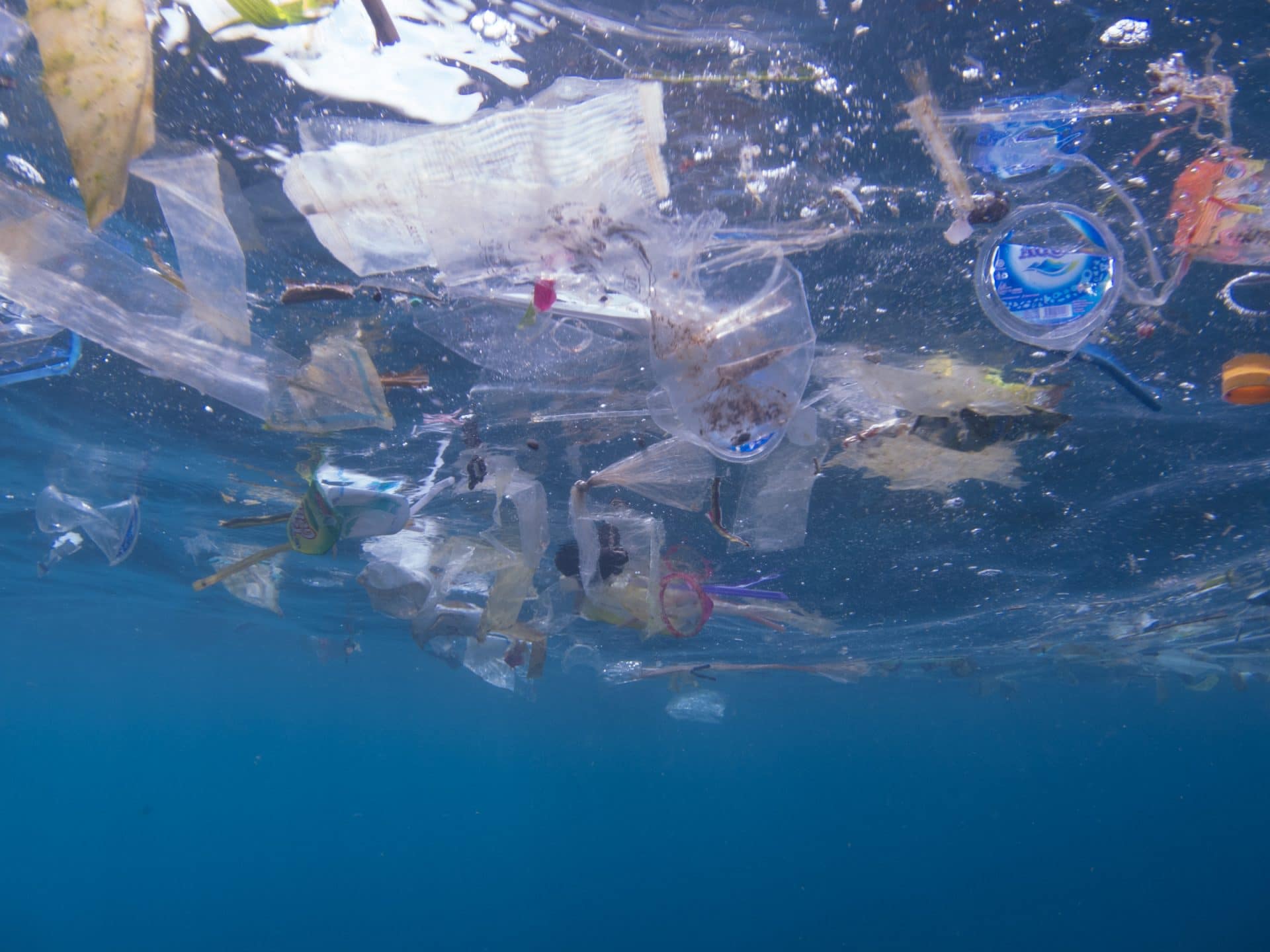
Plastics pollute Indonesian feeding grounds of plankton-feeding ocean giants…
Plastic pollution has a tremendous impact on marine life – and reef manta rays and whale sharks are not spared from it. These large filter-feeders swallow hundreds to thousands of cubic meters of plankton-filled water every day, and with it, tiny plastic pieces from broken down carrier bags and single-use packaging, a new study has found.
Marine biologists from the Marine Megafauna Foundation, Murdoch University (Australia) and Udayana University (Indonesia), estimated the amount of plastic particles present in the waters off Nusa Penida (Bali), Komodo National Park and East Java in Indonesia and, based on that, calculated how many pieces reef manta rays and whale sharks might be ingesting. These shark species sieve nutrient-rich water through their gills as they swim.
As manta rays and whale sharks spend a lot of time feeding in inshore surface waters where trash commonly aggregates, the researchers used a plankton net to trawl for plastics in the top 50 cm of the water column. They also counted any debris visible at the surface from the boat.
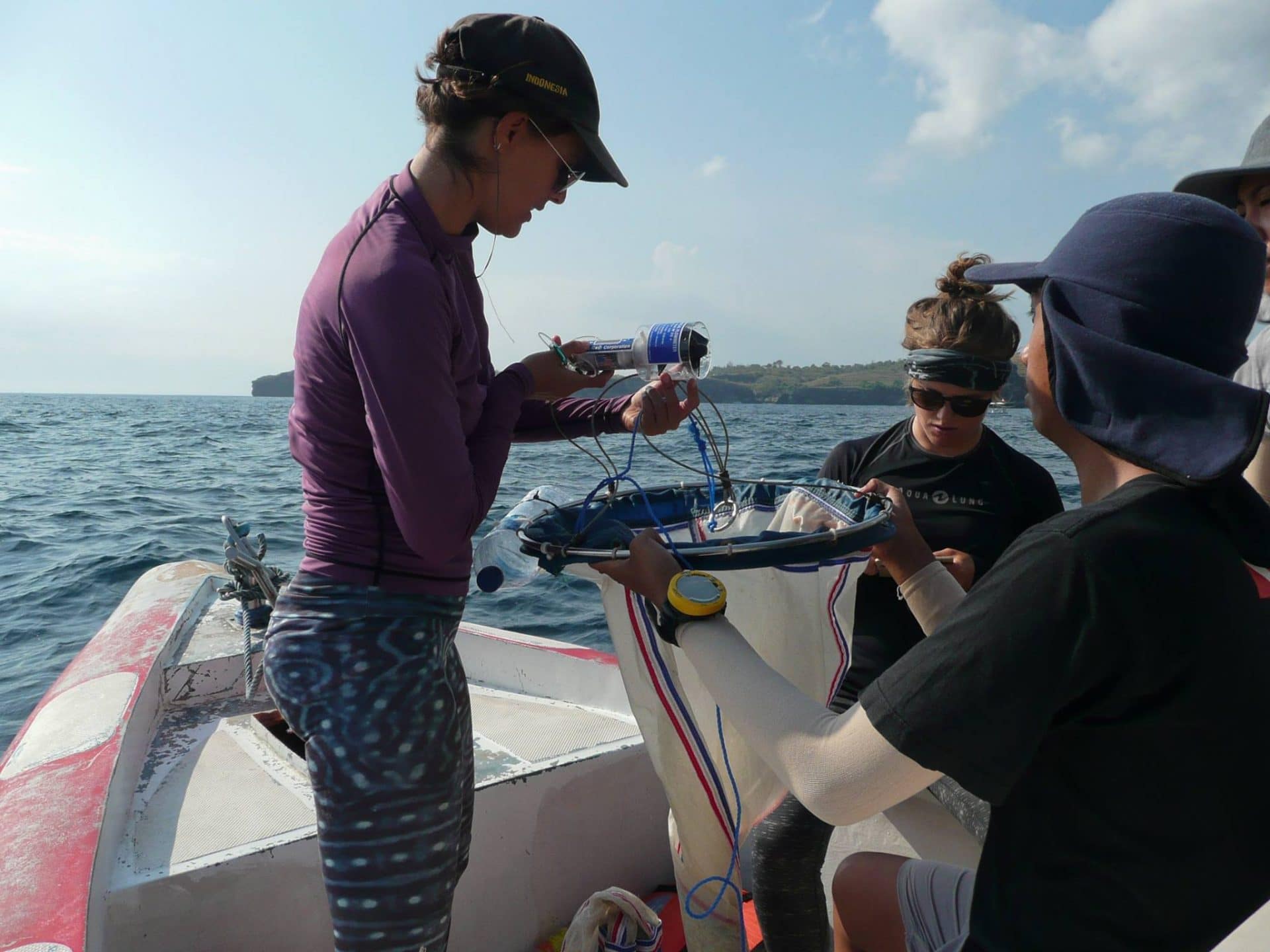
Elitza Germanov on boat – Marine Megafauna Foundation
Lead author Elitza Germanov, a researcher at the Marine Megafauna Foundation and PhD candidate at Murdoch University, said: “With time, plastics break down into smaller pieces called microplastics that large marine filter feeders might accidentally scoop up because they float among their prey.”
“Manta rays and whale sharks can ingest microplastics directly from polluted water or indirectly through the contaminated plankton they feed on,” she adds.
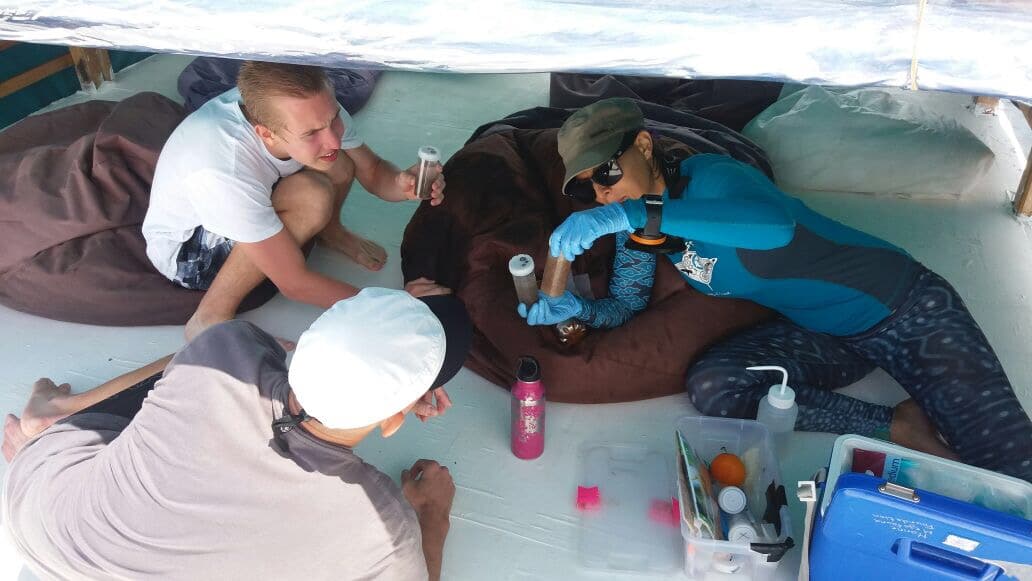
Plankton microplastics sampling – Marine Megafauna Foundation
The collaborative study, which is published today in the journal Frontiers in Marine Science, found that reef manta rays may ingest up to 63 pieces of plastic per hour of feeding in Nusa Penida and Komodo National Park. Whale sharks, which seasonally aggregate in Java, could be ingesting up to 137 pieces per hour.
Thin and bendable films from single-use bags and wrappers as well as hard fragments were the most prevalent plastics (over 50% combined). Of all plastic recorded, around 80% were small pieces of less than 5mm, so-called microplastics.
Manta ray poo and vomit also tested positive for plastics, which means that plastics are easily ingested when filter feeding and likely expose the animals to toxic chemicals and pollutants found in plastics while in their digestive system. These toxic substances can accumulate over decades and alter the hormones that regulate an animal’s metabolism, growth and development, and reproductive functions. Larger plastic particles can block nutrient absorption and cause damage to the digestive tract of animals.
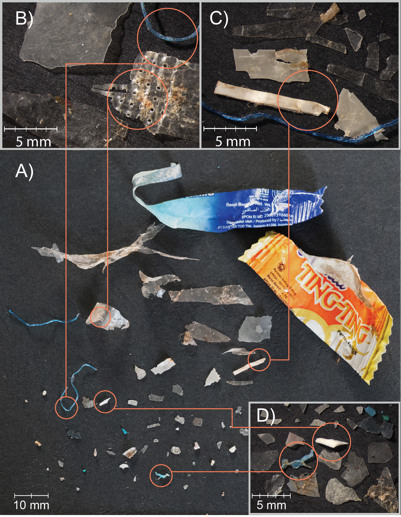
Microplastics in manta poo (c) Elitza Germanov et al 2019
Neil Loneragan, Professor of Marine Ecology and Conservation at Murdoch University said: “It is difficult to assess how much plastic manta rays and whale sharks actually ingest because conventional methods used to study animal diets, such as stomach analysis, are unsuitable for threatened species like these.”
Manta rays and whale sharks are globally threatened species facing extreme pressures from overfishing. They are often caught incidentally in nets or become entangled in fishing lines.

Manta with plastic in Indonesia – Elitza Germanov, Marine Megafauna Foundation
Indonesia is currently ranked as the second worst plastic polluter in the world and many neighbouring countries within the Coral Triangle are among the top 10. This study found that plastic abundance was up to 44 times higher during the rainy season, with the largest seasonal effect observed in Nusa Penida.
Dr. I. Gede Hedrawan, an Indonesian plastics researcher from Bali’s Udayana University and an author on this study, said: “The seasonal variability in plastic pollution shows what a difference it would make to clean up river beds before the rainy season begins.” Local authorities could also prohibit any waste disposal in areas around water sources.
“We welcome Bali’s recent ban on single-use plastic bags, straws and take away containers, although the law is yet to reach its full effect and spread to smaller businesses,” he says.
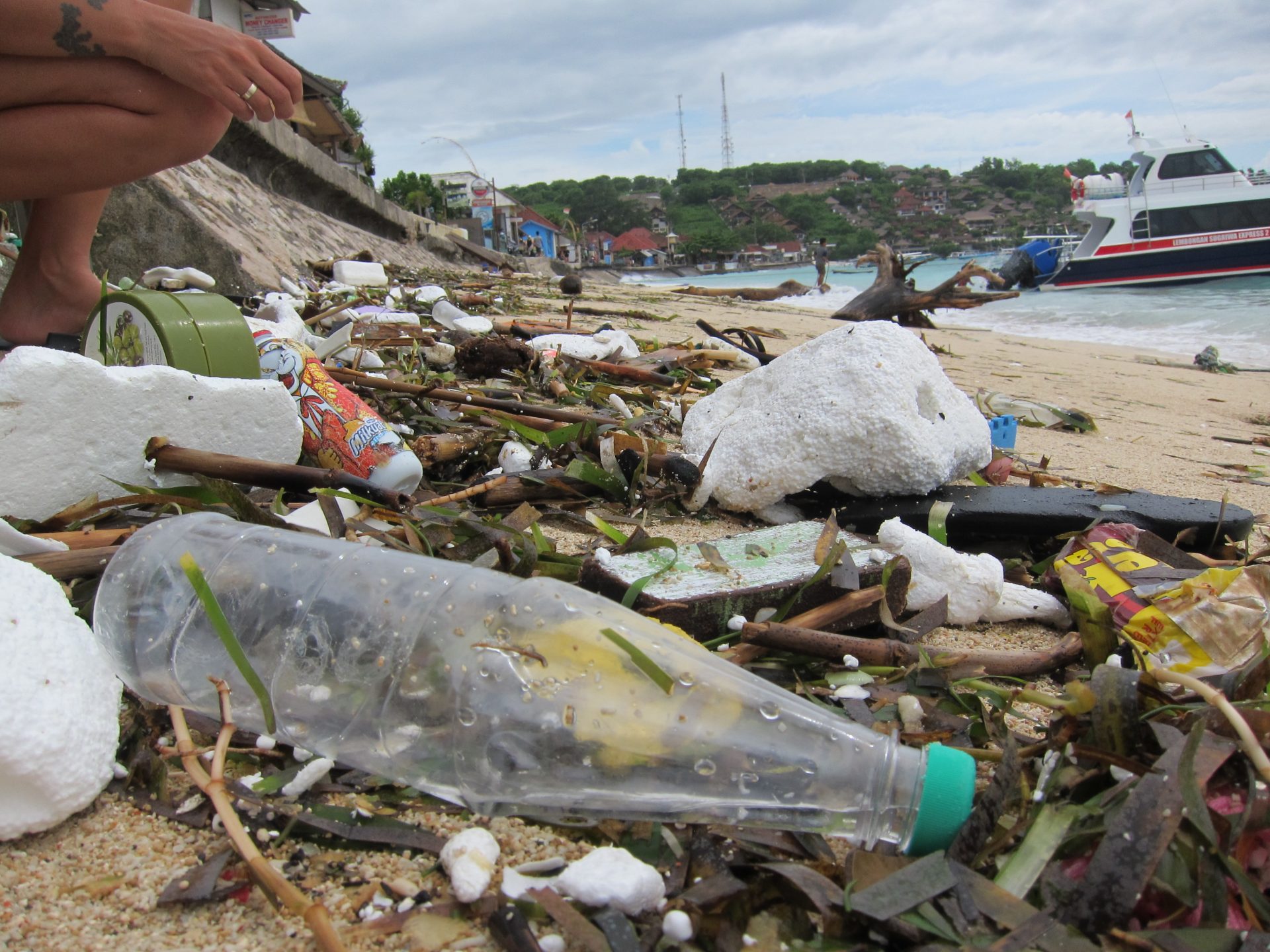
Trash on beach Indonesia – Elitza Germanov, Marine Megafauna Foundation
It is vital to understand the effects of microplastic pollution on ocean giants since nearly half of the mobulid rays, two thirds of filter-feeding sharks and over one quarter of baleen whales are listed by the IUCN as globally threatened species and are prioritized for conservation. Previous studies found that baleen whales may swallow microplastic particles in the thousands every day.
“We now know that, through exposure to toxic substances, plastic contamination has the potential to further reduce the population numbers of these threatened animals because they reproduce slowly and have few offspring throughout their lives,” Germanov concluded.
As plastic production is projected to increase globally, future research should focus on coastal regions where pollution overlaps with the critical feeding and breeding grounds of these ocean giants. Many areas such as the Nusa Penida Marine Protected Area and Komodo National Park are biodiversity hotspots with significant marine tourism.
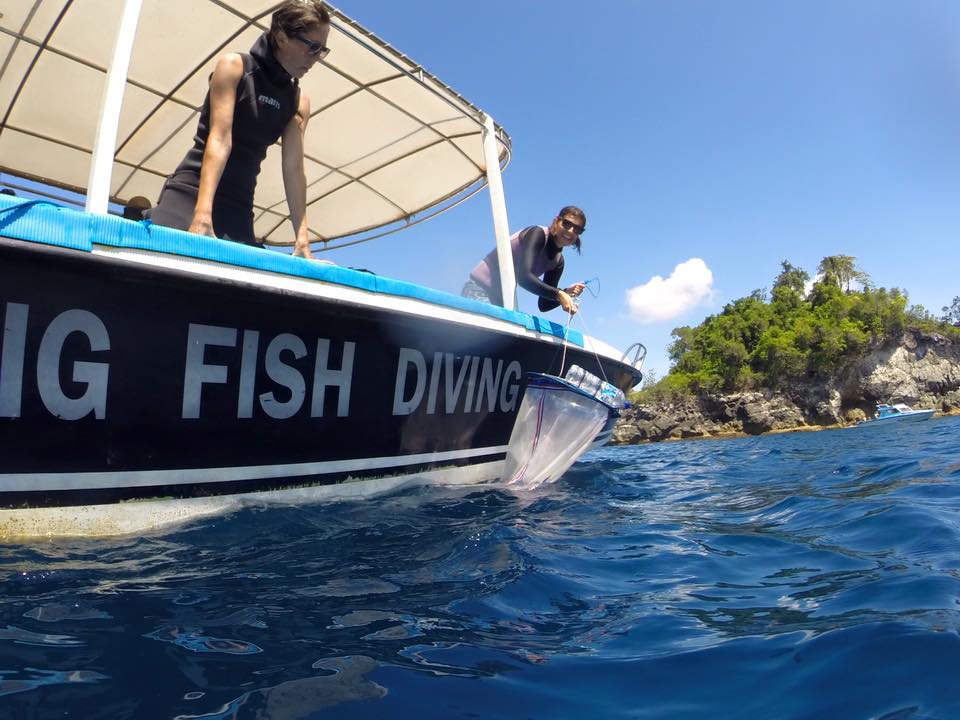
Trawling microplastic – Marine Megafauna Foundation
The field research was supported by the Ocean Park Conservation Foundation, PADI Foundation, Foundation FortUna, Mantahari Oceancare, Arenui Boutique Liveaboard, Current Junkies Liveaboard, Happy Days yacht, Scuba Junkie Komodo, and Wunderpus Liveaboard, and was carried out under a RisTek-Dikti (Indonesian Ministry of Research) permit.
The study by Elitza Germanov et al., titled ‘Microplastics on the menu: Plastics pollute Indonesian manta ray and whale shark feeding grounds’ is published in the journal Frontiers in Marine Science on 19 November 2019 and is available here: https://www.frontiersin.org/articles/10.3389/fmars.2019.00679/full
For further details, please see www.marinemegafauna.org or follow them on Twitter, Facebook and Instagram. For information about regional projects, follow the Marine Megafauna Foundation’s Southeast Asia Facebook page.
Marine Life & Conservation
Paul Watson Released as Denmark Blocks Japan’s Extradition Bid

Renowned anti-whaling activist Paul Watson has been released from custody in Greenland after spending five months in detention. Denmark’s Justice Ministry rejected Japan’s request for his extradition, citing insufficient guarantees that his time already served in custody would be credited against any potential sentence.
The 74-year-old Canadian-American was arrested on July 21 in Nuuk, Greenland’s capital, when his ship docked to refuel. His arrest was based on a 2012 Japanese warrant related to a 2010 encounter in Antarctic waters. Japan alleged Watson obstructed operations and caused damage to a whaling research ship during efforts to disrupt illegal whaling. Watson has consistently denied these claims, maintaining his commitment to marine conservation.
Denmark, which oversees extradition matters for Greenland, concluded that while the legal conditions for extradition were met, the lack of assurances from Japan regarding time-served credit made extradition untenable.
In a video shared by his foundation, Watson expressed gratitude and relief, saying, “After five months, it’s good to be out… and good to know they’re not sending me to Japan.” He added that the most difficult part of his time in custody was being separated from his two young sons.
Watson is a pioneering figure in marine conservation, known for founding the Captain Paul Watson Foundation in 2022 after decades of activism with the Sea Shepherd Conservation Society. His bold efforts to defend marine life have earned him widespread support, including from celebrities and conservationists. His work has also been featured in the acclaimed reality TV series Whale Wars.
Watson’s lawyer, Jonas Christoffersen, praised the decision, stating, “We are happy and relieved that Paul Watson is now free.” He added that Watson is eager to reunite with his family and continue his vital work.
The arrest occurred while Watson’s vessel, the M/Y John Paul DeJoria, was en route to the North Pacific with a team of 26 volunteers to intercept a Japanese whaling ship. His foundation described the arrest as politically motivated and emphasized that Watson’s actions were focused on ending illegal whaling practices.
Japan resumed commercial whaling in 2019 after leaving the International Whaling Commission, asserting that whale meat is a cultural tradition. Conservationists, however, continue to challenge these practices, highlighting their impact on marine ecosystems.
Despite the challenges, Watson remains steadfast in his mission to protect marine life and bring attention to whaling practices. His dedication to ocean conservation has made him a globally respected advocate for the environment.
Marine Life & Conservation
12 Days of Zero-Waste Fish-mas

This holiday period, the Marine Conservation Society, the UK’s leading ocean membership charity, invites you to make some simple changes to eating fish this Christmas to help our seas.
Dr Kenneth Bodles, Head of Fisheries and Aquaculture at the Marine Conservation Society, said, “During the festive season, our consumption increases, but so does waste. Sustainability isn’t just about where food comes from – it’s also about how you use it. By reducing waste and making the most out of your seafood, you’re not only taking steps to be more ocean-friendly, but can also help to cut costs during what is often one of the most expensive times of the year”.
The Marine Conservation Society has compiled twelve tips on how to consume seafood sustainably with zero-waste this Christmas:
Buy whole fish instead of fillets
Instead of fillets, consider buying whole fish such as salmon, hake, or lemon sole. By adopting a “nose to tail” approach with cooking, whole-baked fish not only feeds a crowd, but also helps to minimise waste and maximise sustainability by using up every part of the animal, including bones, skin, and fat.
Make fish stock
Leftover fish bones or shells can be put to good use by boiling them to make a nourishing fish stock or bisque. This can be frozen and preserved for later use and makes for a flavourful base in a soup.
Make your own fish pâté
Avoid waste by turning leftover fish, such as smoked mackerel or salmon, into a delicious pâté by blending with cream cheese and lemon. Perfect when paired with crackers.
The sustainability of salmon and mackerel varies depending on where and how it is caught or farmed. For more information on green-rated options, check the charity’s Good Fish Guide.
Buy frozen
By purchasing seafood that is frozen or vacuum-packed, this helps to reduce waste by extending the shelf life of your food.
Fish pie
If you’re wondering what to do with leftover cooked fish, why not opt for a classic fish pie with mashed potatoes, leeks, and a cheesy sauce? A sure crowd pleaser on Boxing Day.
Use the head
Don’t forget the fish head! The meat is incredibly tender and flavourful. The charity recommends a cod’s head curry or recreating Fallow’s renowned cod’s head in siracha butter.
By stretching your ingredients further, not only is this a more sustainable way to enjoy seafood, but also cost-effective by repurposing leftovers and cooking creatively.
Boxing Day brunch
Mix leftover kippers or smoked salmon with scrambled eggs for a tasty, zero-waste, Boxing Day brunch.
For best choice, make sure you buy kippers, or herring, from the North Sea and the North Irish Sea.
Zero-waste storage
A top tip from the Marine Conservation Society to avoid waste is freezing fish offcuts to save for future use.
Crisp up the skin
Even leftover fish skin can be turned into a quick savoury snack by crisping it up in an air fryer with a little olive oil and salt.
Anchovies two ways
Leftover anchovies can either be blended with butter to make a delicious anchovy butter or tossed into pasta for a hit of umami flavour.
The charity recommends opting for anchovies caught in the Bay of Biscay for best choice.
Fishcakes
For an easy, zero-waste meal, leftover seafood trimmings can be mixed with mash and fried in breadcrumbs to make fishcakes.
Pickled mussels
Try pickling mussels in 1:1 vinegar and water, with a dash of sugar for a sustainable, zero-waste snack that can be enjoyed well beyond the festive season.
Mussels farmed in the UK are a seafood superhero. Grown using low-impact methods and harvested by hand, they get all the food they need from the sea around them. This makes them one of the most sustainable, ocean-friendly, and cost-effective seafood options.
Players of People’s Postcode Lottery have raised £6.6M towards the Marine Conservation Society’s vital work in making seafood more sustainable.
Laura Chow, Head of Charities at People’s Postcode Lottery, said: “Fish is a festive favourite for many, but making sustainable choices when it comes to how we buy and eat seafood makes all the difference for our ocean. Support from players of People’s Postcode Lottery has helped the Marine Conservation Society further its sustainable seafood work, so that we can all enjoy healthier, better protected seas.”
The Marine Conservation Society encourages you to make sustainable seafood choices a year-round habit, not just for Christmas. To check how sustainable the seafood on your plate is, you can visit the charity’s Good Fish Guide. The Guide helps consumers and businesses identify the most sustainable seafood using a simple traffic light system, based on where and how species are caught or farmed. Green is the best choice, amber means improvements are needed, and red indicates fish to avoid buying.
Zero-waste gift idea
Why not embrace a zero-waste Christmas by gifting a membership to support marine conservation? It’s a meaningful, low-waste gift that helps protect our ocean for generations to come. Memberships start from as little as £5 a month – the price of a sandwich and drink from your local coffee shop.
Find the latest sustainable seafood advice for wild-caught and farmed seafood on the Good Fish Guide, downloadable to your phone from www.mcsuk.org/goodfishguide.
-

 News2 months ago
News2 months agoIconic SS United States to become the World’s Largest Artificial Reef
-

 News3 months ago
News3 months agoBook Review – 52 Assignments: Underwater Photography
-

 Gear News3 months ago
Gear News3 months agoDYNAMICNORD – New German diving brand enters the British market
-

 News3 months ago
News3 months agoExploring Cenote El Pit: A Diver’s Dream
-

 Gear News3 months ago
Gear News3 months agoTry BARE drysuits (and maybe even win one!) this Friday with Sea & Sea at North West Dive Fest
-

 Marine Life & Conservation3 months ago
Marine Life & Conservation3 months agoBook Review: Coral Triangle Cameos
-

 Blogs2 months ago
Blogs2 months agoDive the Egyptian Red Sea this Autumn with Regaldive
-

 News3 months ago
News3 months ago2024 Ocean Art Underwater Photo Competition Announced



